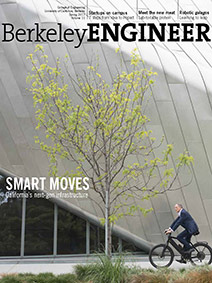Safer transfusions
 With serious trauma comes the risk of acute traumatic coagulopathy (ATC), a biological response that impairs blood coagulation, increases bleeding and multiplies the death rate by four. ATC is challenging to diagnose quickly, often requiring massive blood transfusions that are not targeted to the patient. Rushed transfusions in emergency medicine situations can lead to mortality rates as high as 70 percent. But bioengineering professor Adam Arkin, researcher Amor Menezes and their team have used control theory to develop a simple, fast diagnostic model that could personalize the treatment of ATC patients. This model requires only a few concentrations of rapidly measurable coagulation proteins in a blood sample. In a recent in vitro study, they accurately predicted an hour-long laboratory test and rapidly determined individual transfusion requirements to control a driver of coagulation. The researchers hope that this new model will result in lifesaving medical care for ATC patients.
With serious trauma comes the risk of acute traumatic coagulopathy (ATC), a biological response that impairs blood coagulation, increases bleeding and multiplies the death rate by four. ATC is challenging to diagnose quickly, often requiring massive blood transfusions that are not targeted to the patient. Rushed transfusions in emergency medicine situations can lead to mortality rates as high as 70 percent. But bioengineering professor Adam Arkin, researcher Amor Menezes and their team have used control theory to develop a simple, fast diagnostic model that could personalize the treatment of ATC patients. This model requires only a few concentrations of rapidly measurable coagulation proteins in a blood sample. In a recent in vitro study, they accurately predicted an hour-long laboratory test and rapidly determined individual transfusion requirements to control a driver of coagulation. The researchers hope that this new model will result in lifesaving medical care for ATC patients.

